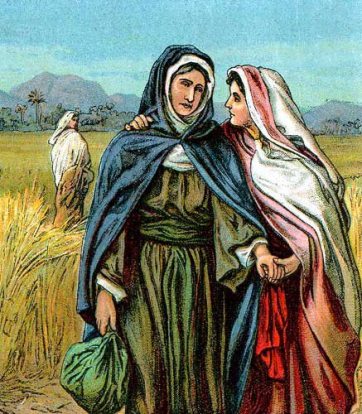Ruth and Naomi

“Delight thyself also in the LORD; and He shall give thee the desires of thine heart. Commit thy way unto the LORD; trust also in Him; and He shall bring it to pass.” Psalm 37:4-5
David the king of Israel wrote these words. His grandmother was Ruth, a native of Moab. The four chapter short story of Ruth is sandwiched between the books of Judges and I Samuel in the Old Testament.
As the story goes, Elimelech and his wife Naomi were part of the Israeli tribe of Judah. They lived in Bethlehem, which means “House of Bread”. In this region a famine occurred and crops wouldn’t grow. It became so bad, the couple decided to move for a while to a place not experiencing drought and famine. They took their family of two boys to neighboring Moab. Today, we might call them refugees. They now had food to eat, but something happened and Elimelech died. The boys grew up and married Moabite women. Then, oddly, the two sons died also, leaving three widows with no means of support.
After living in Moab ten years, Naomi learned God had given her homeland bread again. She was ready to leave this place and return to Bethlehem. It was beginning to look like coming to Moab might not have been the best idea. BUT GOD is always up to something good. At the very time things looked the most bleak, God was at work.
One of Naomi’s daughters-in-law, Orpah, reluctantly agreed to part ways with her and remain in Moab. However, Naomi’s other daughter-in-law, Ruth, seemed to come alive at the prospect of leaving her own heritage behind. She was eager to move to Israel to be with Naomi and become an Israeli citizen. She wanted Naomi’s God to be hers also.
What can we learn from Ruth? She looked beyond the immediate. She could have stayed in Moab and returned to her mother. To find fulfillment, Ruth gave up her citizenship in Moab. In exchange for this earthly treasure, God gave her His heavenly treasure. Upon arriving in Bethlehem with Naomi, Ruth chose to pursue a positive outlook. She sought to help out and found something to do. Crops were being harvested, and Ruth went to the field to get some food for the two of them to eat. She was not afraid of hard work. She did what she could to improve their situation. Ruth was submissive and respectful to authority, both in the field picking barley, corn and wheat, as well as following Naomi’s instructions to her.
The happy result was Ruth ended up married to the landowner in whose field she picked. She and her husband had a son, who was the father of David the king. So Ruth became David’s grandmother. A number of years later, Jesus was born of this same bloodline of Judah, in the same town where Elimelech and his family lived, Bethlehem.
What can we take away from this story of Ruth? How do you get what you want? When the acceptable methods of getting what you want aren’t working, do you pitch a fit? Cry? Threaten? Intimidate? God has a formula. “Delight (be soft or pliable) thyself in the LORD (the self-existent or eternal; Jehovah); and He shall give (add, bestow, pour) thee the desires (a request, desire, petition) of thine heart (feelings, the will and even the intellect; the center of anything). Commit (remove, roll together, trust, seek occasion) thy way unto the LORD; trust (be confident or sure, be bold, put confidence, make to hope) also in Him; and He shall bring (come to pass, to do or make) it to pass.” Psalm 37:4-5
In the days when Elimelech, Naomi and Ruth lived, stories were passed down orally from one generation to another. Upon considering this, I am wondering if David was aware or familiar with his grandmother’s background. These verses David wrote sound like he had done some reflecting on how his grandmother left behind her Moabite background and chose to become an Israelite, trusting God to lead her. As we reflect further, Solomon, David’s son, said something similar: “Trust in the LORD with all thine heart; and lean not unto thine own understanding. In all thy ways acknowledge Him, and He shall direct thy paths.” Proverbs 3:5-6
What we do today matters. Other folks are watching and listening to what we do and say. May we all seek to have a good influence on those around us. Jeremiah 29:11-13 states, “For I know the thoughts that I think toward you, saith the LORD, thoughts of peace, and not of evil, to give you an expected end. Then shall ye call upon Me, and ye shall go and pray unto Me, and I will hearken unto you. And ye shall seek Me, and find Me, when ye shall search for Me with all your heart.” We all have an influence on others. Let us strive to be a good one.
May God add to you His peace in this season of your life.


